

Debates: Biotechnology-Mozilla Firefox. Biotechnology and Sustainable Agriculture 2006 and Beyond-Mozilla Firefox. Soil Biotechnology for sustainable Agriculture -a report to the International Federation of Organic Movements (IFOAM)-Mozilla Firefox. Homepage A research report presented at the Sixth International Scientific Conference of the International Federation of Organic Agricultural Movements (IFOAM) - University of California, Santa Cruz August 18, 1986 By: Dr.
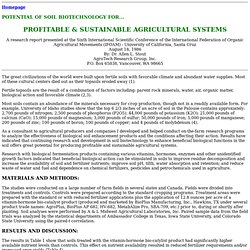
Allen L. Stout AgroTech Research Group, Inc. P.O. Box 65838, Vancouver, WA 98665 The great civilizations of the world were built upon fertile soils with favorable climate and abundant water supplies. Sustainable Agriculture: Can Biotechnology Play A Role?-Mozilla Firefox. PDF Version The sustainability of our everyday actions is becoming more important as we plan for a changing global climate and an increasing global population.
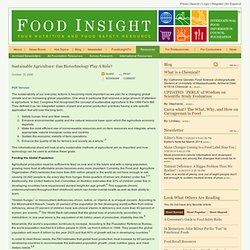
One area in particular that receives a large amount of attention is agriculture. In fact, Congress first recognized the concept of sustainable agriculture in the 1990 Farm Bill. They defined it as “an integrated system of plant and animal production practices having a site-specific application that will over the long term: Satisfy human food and fiber needsEnhance environmental quality and the natural resource base upon which the agriculture economy dependsMake the most efficient use of nonrenewable resources and on-farm resources and integrate, where appropriate, natural biological cycles and controlsSustain the economic viability of farm operationsEnhance the quality of life for farmers and society as a whole.”1 Feeding the Global Population Meanwhile, the world’s population continues to increase.
Feeding the United States. Agricultural Trade Fact Sheet: Biosafety-Mozilla Firefox. Biotechnology and Sustainable Agriculture: Developing Country Perspectives-Mozilla Firefox. Biotechnology and Sustainable Agriculture: A Bibliography, SRB 94-13-Mozilla Firefox. Special Reference Briefs Series no.
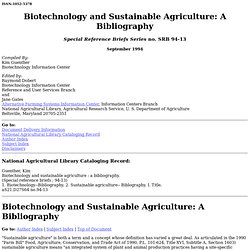
SRB 94-13 September 1994 Compiled By: Kim Guenther Biotechnology Information Center Edited by: Raymond Dobert Biotechnology Information Center Reference and User Services Branch and Jane Gates Alternative Farming Systems Information Center, Information Centers Branch National Agricultural Library, Agricultural Research Service, U. S. Go to: Document Delivery Information National Agricultural Library Cataloging Record Author Index Subject Index Disclaimers. E/CN.17/2000/7/Add.2 Sustainable agriculture and rural development - Addendum-Mozilla Firefox. Distr.
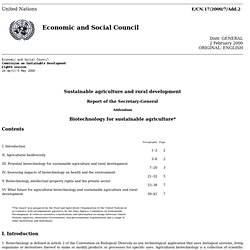
GENERAL 2 February 2000 ORIGINAL: ENGLISH Economic and Social Council Commission on Sustainable Development Eighth session 24 April-5 May 2000. Union of Concerned Scientists-Mozilla Firefox. In general, biotechnology, particularly genetic engineering, is not a fruitful approach in the quest for a sustainable agriculture.
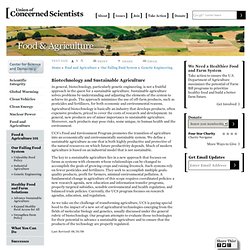
Sustainable agriculture solves problems by understanding and adjusting the elements of the system to achieve its goals. The approach minimizes the use of off-farm products, such as pesticides and fertilizers, for both economic and environmental reasons. Agricultural biotechnology is basically an industry that develops products, often expensive products, priced to cover the costs of research and development. In general, new products are of minor importance to sustainable agriculture. Dimensiones éticas de la crítica agroecológica a la biotecnología agrícola-Mozilla Firefox. ¿Agroecología o biotecnología? Torreón domingo 23 de nov 2008, 11:45am- nota 8 de 15 Por: AGUSTÍN CABRAL MARTELL El país está a punto de tomar partido en el impostergable dilema planetario que ha dividido a los pueblos y gobiernos del mundo en dos grandes bandos: los que están a favor de la libre producción y uso de organismos genéticamente modificados (OGM) en la agricultura y los que se oponen a ellos, invocando criterios y evidencias ligados a la salud, el equilibrio ecológico, la protección de la biodiversidad, la seguridad alimentaria y el respeto a las culturas agrarias.
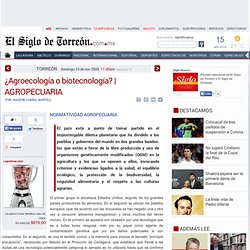
El primer grupo lo encabeza Estados Unidos, seguido de los grandes países productores de alimentos. En el segundo se ubican los pueblos europeos (que de acuerdo con las encuestas se han negado una y otra vez a consumir alimentos transgénicos) y otros muchos del tercer mundo. El debate en realidad encierra un dilema más profundo. FUENTE: Víctor M. Agriculture, Ecosystems & Environment : Agroecology, scaling and interdisciplinarity-Mozilla Firefox. Abstract Based on a review of its history, its present structure and its objective in the future, agroecology is defined as an integrative discipline that includes elements from agronomy, ecology, sociology and economics.
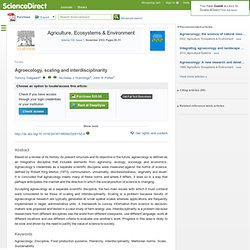
Agroecology’s credentials as a separate scientific discipline were measured against the norms of science, defined by Robert King Merton (1973): communalism, universality, disinterestedness, originality and doubt. It is concluded that agroecology meets many of these norms and where it differs, it does so in a way that perhaps anticipates the manner and the direction in which the social position of science is changing. Accepting agroecology as a separate scientific discipline, the two main issues with which it must contend were considered to be those of scaling and interdisciplinarity. Keywords Agroecology; Discipline; Food production systems; Hierarchy; Interdisciplinarity; Mertonian norms; Scale; Sustainability Copyright © 2003 Elsevier B.V.
Biodiversity - Google Libros-Mozilla Firefox. <em>Biotechnology and Sustainable Development: Voices of the South and North.</em> Edited by I. Seregeldin and G. J. Persley. Wallingford, UK: CABI Publishing (2003), pp. 318, £55.00. ISBN 0-85199-675-2-Mozilla Firefox. Incorporating agroecology into the conventional agricultural curriculum-Mozilla Firefox. Commentary Incorporating agroecology into the conventional agricultural curriculum Miguel A.
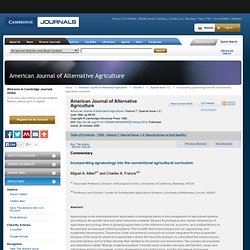
Altieria1 and Charles A. Francisa2. Agriculture, Ecosystems & Environment : The sociology of agricultural sustainability: some observations on the future of sustainable agriculture-Mozilla Firefox. Sustainable agriculture and the environment Department of Rural Sociology, University of Wisconsin, Madison, WI 53706, USA Available online 25 June 2003 View full text It is argued that sociology and the other social sciences can contribute to agricultural sustainability in several ways, one of which is to help in assessing and understanding the social forces that affect agricultural research and agricultural policy.
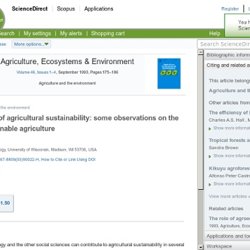
New Dimensions in Agroecology for Developing a Biological Approach to Crop Production - Journal of Crop Improvement-Mozilla Firefox. Agroecology is emerging from the conceptual realm to become a significant discipline in North America and many parts of the world.
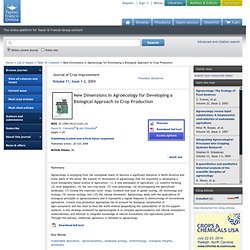
We explore 10 dimensions of agroecology that are important in developing a more biologically-based science of agriculture: (1) a new philosophy of agriculture, (2) systems thinking, (3) local adaptation, (4) the non-crop biota, (5) crop autecology, (6) encompassing the agricultural landscape, (7) closing the materials cycle: crops, livestock and local or global cycling, (8) technology and ecology, (9) human ecology, and (10) the natural dimension. Agroecology deals with the applications of ecological principles in agroecosystems and it represents a logical response to shortcomings of conventional agriculture.
Current crop production approaches fail to account for biological complexities of agro-ecosytems and the need to feed the world without jeopardizing the sustainability of its life support systems. Key Words Related articles View all related articles. Farming the Garden of Eden: a comment-Mozilla Firefox. Expanding opportunities with agroecological approaches-Mozilla Firefox. More avenues for boosting agricultural productivity than just biotechnology-Mozilla Firefox. Professional societies and ... - Google Libros-Mozilla Firefox. Biosafety Information Centre-Mozilla Firefox. The Myths of Agricultural Biotechnology: some ethical questions Miguel A. Altieri Department of Environmental Science, Policy and Management University of California, Berkeley For years academicians have assumed that agriculture poses no special problem for environmental ethics, despite the fact that human life and human civilization depend on the intentional artificialization of nature to carry out agricultural production.
Even critics of the environmental impacts of pesticides and of the social implications of agricultural technology have failed to conceptualize a coherent environmental ethics applicable to agricultural problems (Thompson 1995). In general, most Proponents of sustainable agriculture, driven by a technological determinism lack on understanding of the structural roots of the environmental degradation linked to capitalist agriculture. Ethical Questions About Biotechnology Who gave individual companies the right to the monopoly over entire groups of organisms? Conclusions. Agriculture, Ecosystems & Environment : Agroecology: A new research and development paradigm for world agriculture-Mozilla Firefox. Volume 27, Issues 1–4, November 1989, Pages 37–46 International Symposium on Agricultural Ecology and Environment In its several conceptions, agroecology has emerged as a scientific approach used to study, diagnose and propose alternative low-input management of agroecosystems.
Solving the sustainability problem of agriculture is the primary aim of agroecology. It is maintained here, however, that simply focusing on the technological aspects of the problem, even though promoted technologies are low-input, obscures the fundamental problems that lie behing the technology-induced environmental crisis and rural poverty affecting the agricultural regions of the world. Agroecology can provide the ecological guidelines to point technological development in the right direction, but in the process, technological issues must assume their corresponding role within a strategy of rural development that incorporates social and economic problems. Pamela Ronald Part 1: Sustainable agriculture-Mozilla Firefox.